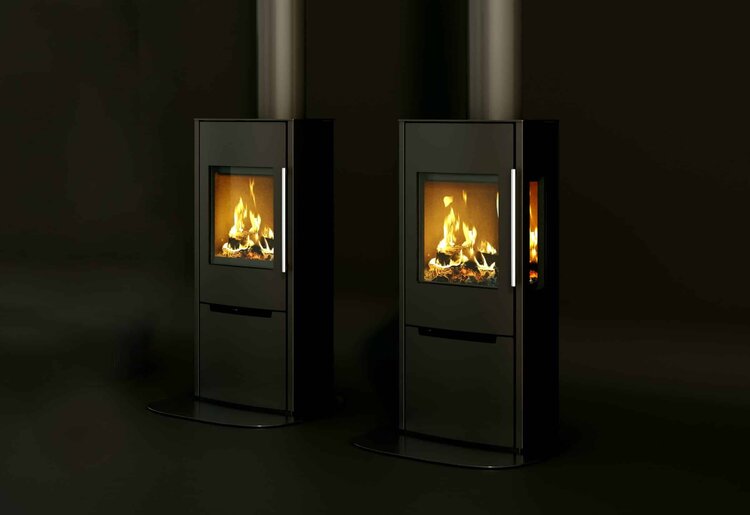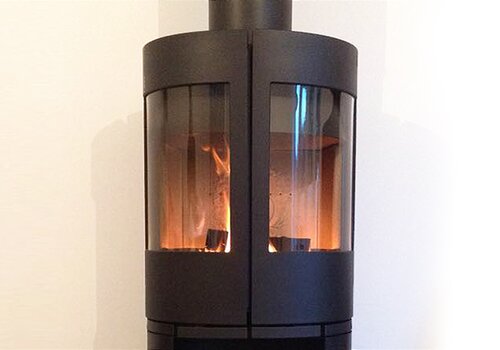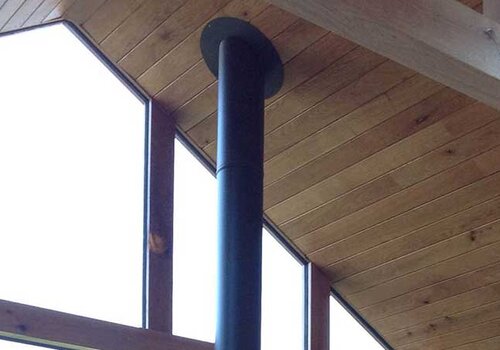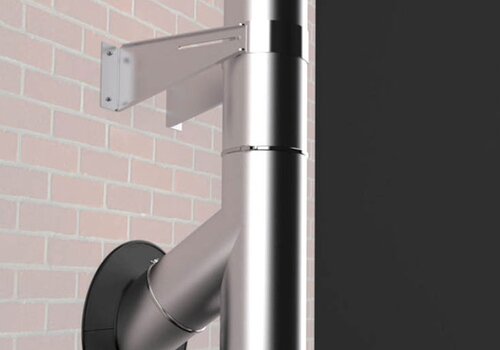Heat pumps / Woodburning stoves – working together
Gas and electricity prices don’t look as if they are coming down anytime soon. Customers who installed a wood burning stove recently have reaped the benefits of avoiding huge energy bills, by choosing to heat their main rooms using naturally sourced and renewable wood.

Break free from the gas and electricity energy grid, with highly efficient wood burning stoves.
Wood logs are now the cheapest domestic heating fuel, and using a modern wood burning stove also costs 29% less to run than an air source heat pump. Wood fuel has the lowest carbon intensity of any domestic heating fuel. Wood logs are 87% less carbon intensive than gas, 88% less than electricity and 74% less than an air source heat pump. However, it’s critical to use low moisture content wood.
Working together with heat pumps.
Heat pumps seem to be prominent in the future of heating. However, there are a few concerns about having them as a dedicated source of heat for your home.Heat pumps will work in cold weather, even down to -15 C degrees, but with current environmental conditions which cause sudden drops in temperatures (like just before Christmas) – then the heat pumps don’t always cope and have to compensate by drawing on more electricity.
The reason for this is that flow and return water temperatures on a heat pump run between 45 – 40 degrees whereas a gas boiler typically runs 70 flow and 60 return. This creates the efficiency as it requires less energy to reach optimal temperatures, however, on colder days will take longer to adapt to lower temperatures – therefore ironically being less efficient on cold days as it needs more energy and therefore cost.
For instant heat, nothing really can better a sustainable Ecodesign, log burning stove.
Installation costs for stoves vary, depending on your property type, but they are considerably less than a heat pump.
For heat pumps, grants are available, but even with those, you are looking at between £8000 – £10000. Long term there will be a reduction in energy costs, plus the cost of installation will invariably come down – but not any time soon.
When installing heat pumps, planning and research is needed, as well as planning permission (in Wales and Northern Ireland) and there will be significant disruption. Not everyone has space in their outdoor area as well.
In comparison to a gas boiler, the heat pump has a number of advantages including reduced maintenance and safety. They are also efficient, far more than a gas boiler and can also provide cooling as well as heating.
However, as a sole source of heat, it doesn’t deliver the amount of heat required on extremely cold days. Adding a secondary source, such as a log burning stove system, such as the Schiedel range of stoves in a self build, or major renovation means that even on the coldest days, there is less reliance on the energy network, considering the extreme costs incurred over the last few years.
Modern Eco Design stoves from Schiedel.
Modern Eco Design stoves from Schiedel, the leading manufacturer of stoves and chimney systems in Europe, are the solution for secondary heating, reducing the need for gas and electricity when looking at heating the home.- No adverse health impacts from exposure to the indoor air typically associated with modern, enclosed wood-burning stoves.
- No evidence of the association between indoor wood burning exposure and asthma risk in developed countries.
- Improved air quality inside the home due to the natural draught created during wood stove operation
- Other sources of particulate matter in the home, such as cooking, candle and incense burning, can release much higher levels of PM compared to modern, enclosed wood-burning stoves.
An all-in-one combined system easy to install.
The advantage of choosing stoves from Schiedel is that the flue system and stove system are provided by the same company. There’s nothing that can replace the convenience and romance of a wood burning stove, so Schiedel Chimney Systems Ltd have devised a comprehensive package that means you can feature a stunning stove when designing or refreshing your home.Complete stove AND chimney package, designed for house builders and developers – no additional parts or materials needed
What is “DEFRA Exempt” or “DEFRA Approved”?
DEFRA (Department of Environment, Farming and Rural Affairs) has strict guidelines on emissions. If a stove or appliance passes these emission level restrictions, then they appear on the official website as “appliances that meet specific criteria”, which our wood burning stoves pass with flying colours. Schiedel stoves are officially listed on the DEFRA website.
If you have house project drawings or designs, then feel free to send them in for advice.
More related content

Guide
Safe stove installation
Wood heating has experienced a huge upsurge in popularity over the past decade. As there is no legal requirement to hold a specific qualific...

Guide
Stove installations in conservatories
Modern living trends include conservatory living as well, as people are staying in their homes rather than moving due to the current financi...

Guide
Stove installation with external chimney
Installing an external chimney system has never been easier, using the latest range of innovative products from Schiedel.






















